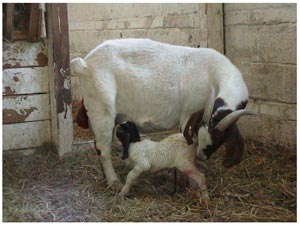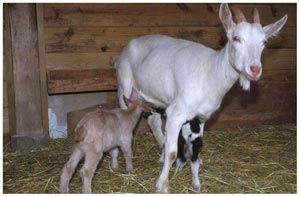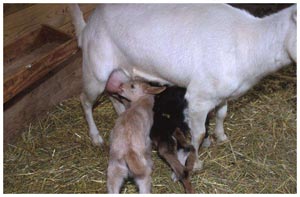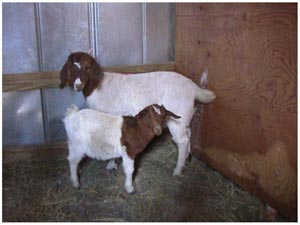Caprine Kidding Information
Preparation
Do you know if your doe is pregnant? If so, when is she due to kid? Most goat pregnancies last about 145 - 151 days. If you know when she had her last heat or when she was exposed to the buck, you can calculate the approximate due date. If you prefer, you can have your veterinarian perform an ultrasound evaluation on your doe to determine pregnancy status. If this is done during the proper time, fetal numbers may also be determined.
Next, you should make sure your doe is up to date on her health care. Good health care begins with proper nutrition. What your goat needs depends on many different factors. You can consult you veterinarian or nutritionist for optimal feeding recommendations. Make sure that proper trace minerals and free choice fresh water is available at all times. It is very important to keep feet properly trimmed so that your goats can get to and from their food and water sources comfortable.
It is best to have your does dewormed and vaccinated about 4 weeks or more before they kid. The minimal set of vaccines should include, enterotoxemia (Clostridium perfringens type C and D) as well as tetanus. This will allow her to pass protection against these diseases to the kids through her first milk, or colostrum. Therefore, it is very important that the first food fed to a kid be the best quality colostrum available. You may also want to have your doe tested for CAE (Caprine Arthritis Encephalitis) virus. This virus can cause arthritis and neurological problems and is passed through the milk. Your veterinarian can take a blood sample to test for this virus. If your doe tests positive for CAE, you may choose to feed your kids pasteurized milk, or milk replacer, so that they do not catch the virus.
The Delivery
Once you know your doe's due date, her udder will become full with milk. She will probably separate herself from other goats in the herd, and find a protected space in which to give birth. When a goat is delivering kids, the feet are the first parts of the kid to appear. If you see any part other than the two front or hind feet (such as a head or tail, or more than 2 feet), it may be an emergency, so you should call your veterinarian right away. Also, if you notice that your doe is straining to deliver for more than half an hour and does not seem to be making progress, call your veterinarian immediately. Goats can have up to four kids but two is a very common number. After the kids are born, the placenta (afterbirth) should be expelled within 4 hours. If it is not passed by the following day call your veterinarian.

The First Few Hours
There are a few things you need to do in the first few hours of the kid's life:
Dip the navel. Once the umbilical cord has broken, dip the stump with a 7% iodine solution or chlorohexidine.
Make sure that the kid is breathing clearly and free of defects.
If a kid is weak or has not stood to nurse within 1-2 hrs, offer assistance.
Make sure the kids are nursing. If you know your doe is positive for the CAE virus, you may choose to milk her and heat-treat the colostrum, and later pasteurize the milk. This may prevent her kids from getting the virus. Make sure that bandit kids don't steal a meal from the affected doe or they may become infected. If the kid does not nurse within 2 hours and will not drink from a bottle, call your veterinarian.
 
The First few Weeks
During the first few weeks of your kid's life, they will be getting all their nutritional requirements from milk. They need 10-15 % of their body weight in milk daily for growth and development. You should begin providing them access to solid food, such as goat pellets and alfalfa or high quality grass hay, within their first few weeks of life. Kids may be weaned after they are consuming about 1%b of their body weight in kid starter ration and hay.
Some people choose to have their goats dehorned, especially if they are a dairy breed of goat. If you have more than one goat and some are dehorned, it is best if you dehorn all. If you want your kids dehorned, it is best to have it done within the first few weeks of life. At this time the horns are only buds and are less traumatic to remove.
Castration of male kids may be done before 2 weeks of age in production situations. If the kid will be sold as a pet, castration should be delayed until 5-6 months of age to reduce chances of bladder stones causing urethral obstructions.

If your doe was vaccinated before the kids were born and the kids drink her colostrum, the kids will be protected for at least 6 weeks They should not be vaccinated until age 6 to 8 weeks for tetanus and enterotoxemia (Clostridium perfringens C and D or per product label instructions). If the doe was not vaccinated, the kids should be vaccinated within the first few weeks of life.
| 
